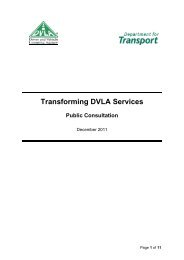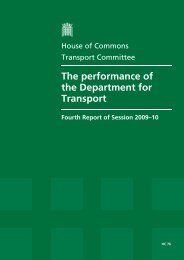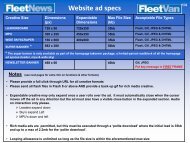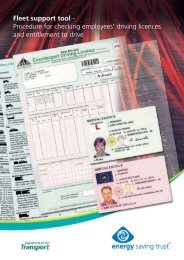Zurich Guide to Managing Grey Fleet Risks - Fleet News
Zurich Guide to Managing Grey Fleet Risks - Fleet News
Zurich Guide to Managing Grey Fleet Risks - Fleet News
You also want an ePaper? Increase the reach of your titles
YUMPU automatically turns print PDFs into web optimized ePapers that Google loves.
Whatever vehicle specification is agreed on for grey fleet employees,<br />
it is vital that they are maintained <strong>to</strong> a minimum standard. There are<br />
two aspects <strong>to</strong> this:<br />
1. The maintenance schedule laid<br />
down by the manufacturer. It is<br />
important that this is followed, using<br />
approved garages, <strong>to</strong> minimise the risk<br />
of malfunction and associated risks<br />
discussed above. For grey fleet<br />
employees there may be a temptation<br />
<strong>to</strong> cut costs and either carry out<br />
servicing/maintenance themselves, or<br />
go outside of the approved garage<br />
network. Whilst this route may lead <strong>to</strong><br />
a good standard of maintenance, it is<br />
difficult or impossible <strong>to</strong> verify, and as<br />
such, from a Duty of Care perspective,<br />
it should not be allowed. Maintenance<br />
records (and MOT certificates where<br />
appropriate) should be checked by the<br />
employer on a regular bases (at least<br />
annually), with random checks being<br />
carried out in the interim. The required<br />
level and standard of maintenance<br />
should be incorporated in<strong>to</strong> any<br />
relevant policies and procedures.<br />
2. Routine maintenance, and this is an<br />
area where organisations have difficulty<br />
managing their owned/leased fleet<br />
drivers. It is important that drivers<br />
regularly carry out their ‘POWER’ checks:<br />
Petrol/diesel (fuel)<br />
Oil levels<br />
Water levels – coolant and wash bottle<br />
Electrics – primarily lights<br />
Rubber – tyres and windscreen wipers.<br />
In reality, very few employees carry these<br />
checks out, but they are vital <strong>to</strong> minimise<br />
the risk that any malfunction associated<br />
with these checks leads <strong>to</strong> a collision.<br />
‘POWER’ checks should be undertaken<br />
at least once per week and before any<br />
long journey.<br />
There is no practical way of ensuring that<br />
routine maintenance is being carried out,<br />
so the best way <strong>to</strong> manage this is by<br />
regular safety communications with<br />
employees and also undertaking random<br />
vehicle audits, where any deficiencies may<br />
be uncovered. This raises problems with<br />
the grey fleet as, being privately-owned, a<br />
common natural reaction of the employee<br />
is <strong>to</strong> say that the organisation has no right<br />
<strong>to</strong> do this. In reality, this view is probably<br />
correct unless the contract of employment<br />
and relevant policies and procedures have<br />
been written with this process in mind.<br />
18









